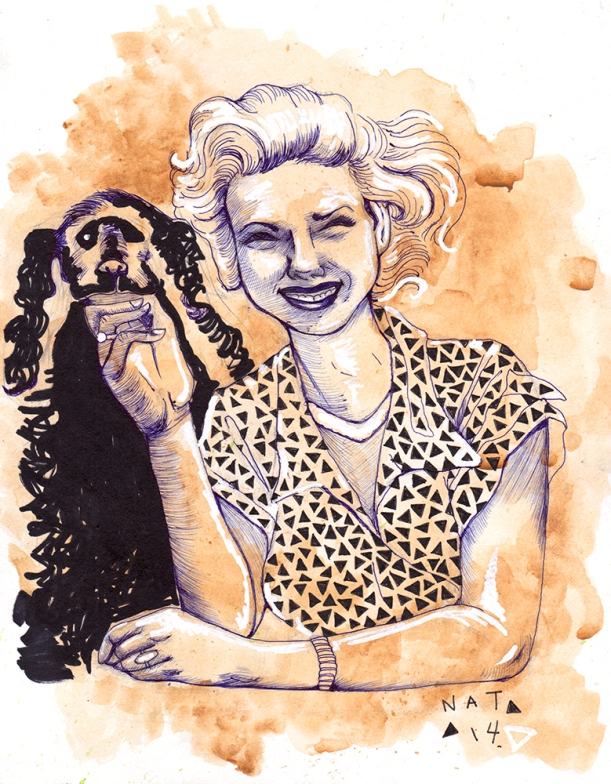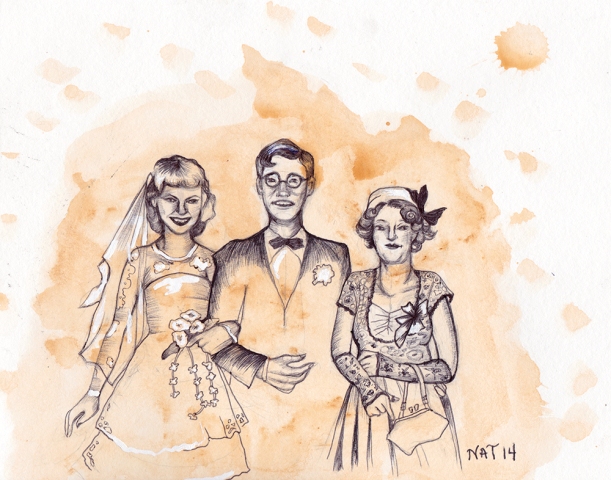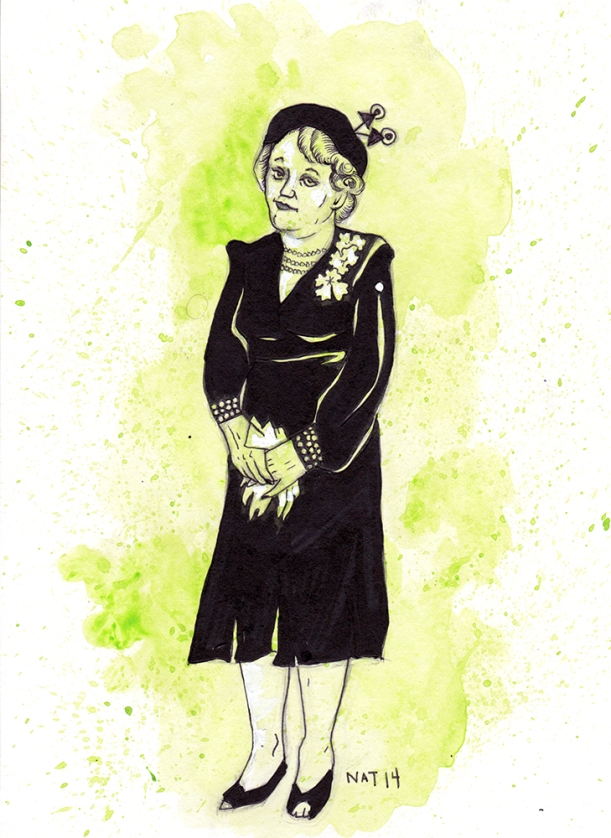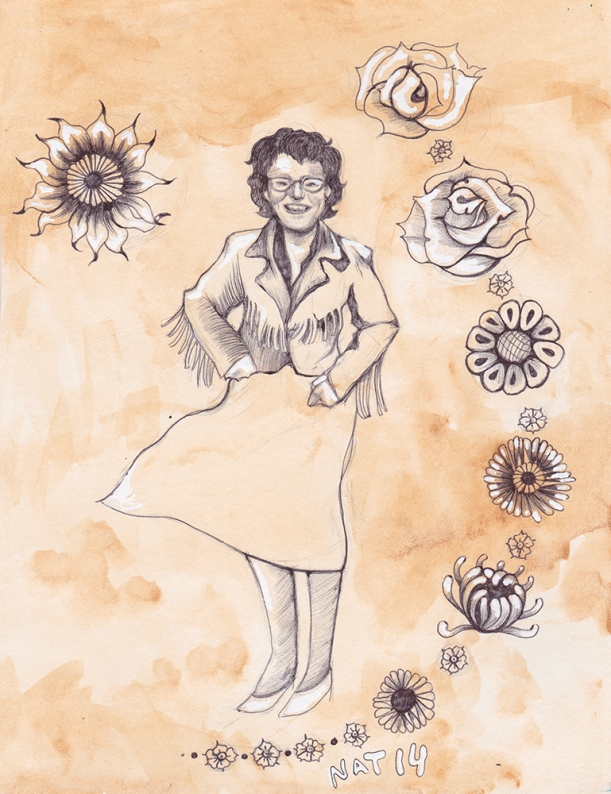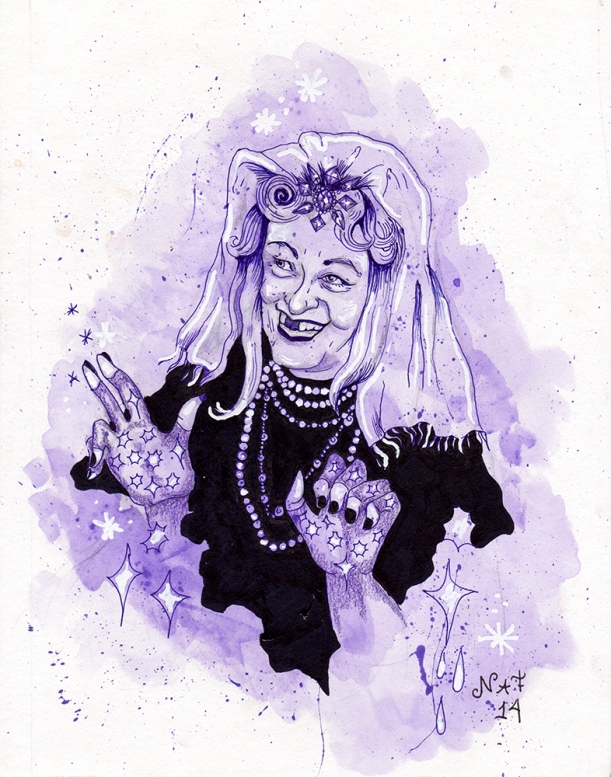My favorite photo of my grandma captures her with “a dog nobody talks about anymore.” Its a grainy, black and white photo taken right after she got engaged to grandpa. Her hair blowing in the wind, a smile radiating across her whole face, the scene just brims with youthful optimism – she literally seems to be looking forward into the future, and she likes what she sees.
Leaving my grandma, and my Dad, at the St. Louis airport was incredibly hard. But I’m glad we had a chance to sit down a few times during my visit to talk about her life before she was a grandmother.
Grandma On Her Early School Life:
“I went to a two room school. Four grades in each room. We could do a lot of things kids couldn’t in a bigger school. We’d find these little lizards and carry them. Sometimes you could put them in your pocket, if you didn’t, you’d carry them in a sack. We had a lunch room – that was the only place you couldn’t carry them.
“To go to school we had to walk through a pasture, through barbed wire fences. It took us half an hour to get to school, summer or winter. Sometimes we’d find baby rabbits that were deserted, or a bird with an injured wing, and we’d put them in a shoebox and try to help em. Of course, they always died.
“The only thing we stayed away from were the snakes. We didn’t care for the snakes. Once, Dad brought a baby goat home. We kept it til it got too big and started to smell bad. But we had chickens. Raleigh raised rabbits and sold em to people who ate em. I didn’t like that, but that’s how it was. Same with the chickens. So we had quite an experience as kids.
“I loved horses. My dad, having grown up out west in Montana, a horse to him was not a toy; it was a necessity. It was a means of moving logs, ploughing, pulling wagons. It wasn’t something you rode only, it had to be a work horse.
“So he would take me to a stable and he’d show me how to put a saddle on, how to put a bridle on, what to wear while I rode a horse… He’d pay for about an hour.
“About 6 months later, it was early spring, I kept beggin’ him if I couldn’t have a horse, and he said ‘Come here, I’m gonna take you somewhere.’ We drove way out in the country in Belleville, he had his truck that was quite large. I thought ‘Why is he taking a truck this large?’ As soon as we drove up, I thought ‘Oh my god, he’s buying me a horse!’
“He had already bought it. He already made arrangements with a neighbor who had 80 acres. He came home with bales of hay and grain, and spent a lot of time telling me how to walk around a horse – ‘A horse will not hurt you or step on your foot if he knows you’re there.’
“He spent a lot of time with me showing me what to do, then one day he told me: ‘Sis, you’re on your own. Ride it, exercise it.’ Til my senior year of high school, I had 3 horses.
“I outgrew the first one, it was an older horse, it didn’t do much but walk. I was in 8th grade, I named her LuLu after my mother, her name was Lucille.
“The second horse I didn’t keep very long. That horse was not well, he had a problem with one leg. The guy that came to put the shoes on him sensed that he was going lame. I don’t know whether he sold him for meat or what…
“Then I got Scout. We had a riding club, a group of us in high school, and we would all ride out to the east side of Collinsville, and one of our classmates has a large barn, and we would all go out and have pony trips.
“I rode that horse from that area to about 5 miles to my house, all the way through Collinsville. My friend and me, we would go right through Main Street! People would smile and pet our horses. [Says rather sassily]: We didn’t go the back way.
“When I met Jerry, I was a senior in high school. The horses got out. Jerry’s cousin Bob Long also kept his horses there. Our neighbor had a jeep. I asked her if she’d take us because we had to go look for the horse.
“We went all the way through Collinsville and into Maryville, and we found them. We put our bridles on and saddles and we rode those horses back to Collinsville, like kids riding bicycles today. Nobody objected, we didn’t have interstates, we had 2 lane roads. If a car came over, we’d pull over.
“Jerry was in the Jeep too, along for the ride. He had this massive head of curls and he rode back in the jeep and I thought, ‘What a jerk. Who irons their jeans?’
“Anyway his mother did, and that’s how I first met him. And never thought about it til 3 years later, when his brother built a house on our street. Jerry would go by and wave at me, and my mother said ‘I think he ‘s looking at you wanda,’ and I said, ‘Let him look. It’s free.’
“He asked to go on a date with me. I didn’t like to date short guys, shorter than me, cuz I was tall, 5′ 8″ or 9.” I told mother: ‘When he comes up on the porch to pick me up, give me a sign if he’s short or if he’s taller than me.’
So he came up and she went out on the porch and gave me a sign that its ok, and I had him. Two years of that, and 62 years of marriage.
On Working As an Illustrator:
“I went to Hadly Commercial Art School in St. Louis when I graduated from high school. It was actually a two year course. I wasn’t dating Jerry the first year, the second I was dating him. It was strictly commercial art, designing women’s clothes, things for animals.
“Well I got married, and right after we were married in September, Grandpa got an opportunity to work as a repairman in television in sales business about 30 miles away. So I quit my job [at a print shop] and went.
“In March he was drafted, and I came back to St. luis, and I went to work at Scott Field outside of Belleville as an illustrator. These were the schematics for the men in service. Jerry helped me a lot with terminology. I did that for 6 months, then I was transferred to Fort Bragg Carolina and they transferred me, doing the same thing. And that’s where I stayed til he got out.
“Yes. I enjoyed it… It was the kind of a job were you never went to work dressed up, you wore pants…
“I grew up with a mother who was very accepting: No matter what the pay, rewards will come later. All my friends that were typing and doing shorthand were making a lot more pay than I was. But I was having a lot of fun.”
On Grandpa’s Mother:
“She didn’t give us a wedding gift because she said it would never last. It was her way or no way I guess you could say. She and her next door neighbor dreamed all their lives that her daughter, who was two years younger than Jerry, that they would get married, and then here came Wanda [laughs].
“Her sister didn’t come to the wedding and neither did her brother, or their spouses. And she wore black [see above illustration]. She did not want him to get married to me. She thought he was too young to get married, although she got married when she was 16, and Jerry had just turned 21.
“Granddaddy didn’t care, granddaddy liked me. I got along with him really well, he was a super, wonderful father in-law.
“My mother told me not to worry about it, she said: ‘Time will take care of it, don’t say anything.’ But my friends certainly had fun with it – they all noticed it! I’ll show you a picture. It’s obvious, so obvious! I think if you see her picture you would know….
“Sometimes people change as they grow older. They get fonder. I learned how to cope with her, I’d flatter her – and she enjoyed it. ‘Oh Rachel you look so pretty today, that’s a nice dress!’ My mother taught me how to do that.
[Brings out photograph]
“Black, black as black can be! See the look? [points at face]. I think that’s the only picture I’ve got of her. Ask my children. They have no memories of a warm and cuddly grandmother.”
On Momo, Grandmother’s Mother:
“But they had my mother, and she was a very, very good grandmother, and they loved her. Mother was not the typical wife and mother, as women were at that time. She was an artist, and she thought nothing of taking off and doing art on buildings.
“She had a restaurant up in Belleville where she had painted scenes, large scenes, behind bars. And she was a tremendous seamstress, she sewed and made wedding gowns for everybody. She wasn’t the kind of grandmother that stayed home and baked cookies. She spent every weekend taking us to the art museum, to the zoo, to the historical society.
“To her, going fishing and painting and going to the zoo was more important than worrying about what you were going to eat for supper. She did not like to cook, she turned her kitchen over to my brother at an early age. We cooked the meals – she’d give us advice.
“And she loved photography, she had every camera I think that was ever made, and that’s what we thank her for today, all the pictures she took for all of us.
“She painted and loved to mess with clay, and she’d make animals and greenware, I got it all over the house. She had her own shows for ceramics and greenware that she made, she had her own shows at her house, and open house at Christmas, and people would come in and buy it.
“We had a big house in the country, and she decided she wanted to paint it pink. My father was the type of person, he didn’t care what she did. It was quite exciting to have people come over and see the pink house. She went to California to visit her sister and saw all the beautiful colors of the homes and she said, ‘Why not?’
“[The Pink House] reminded them of the mountains in Montana, because it was on a hill. That’s where they stayed until they died.
On Montana and Traveling:
“[In Montana] My father had to walk 2 miles every day to school. He put his brother and sister on the back of the horse and walked the whole way. They had a corral for all the horses because most of the kids came that way.
“Dad’s sister, she was 2 years younger than him, she taught school, country school. Her life was hard. When you have 8 feet of snow, sometimes kids had to stay overnight and sleep at school. The teachers would be locked in with the kids. They had extra fuel, plenty of wood, and they had blankets stored, and they had a stove.
“They left Montana when I was a year old because of the depression. My dad was building elevators in the coal mines and during the depression, they closed all the coal mines, and there was no work. They sold everything they could and got on the train and came to east St. Louis, where mother’s 2 sisters lived.
“I never heard them every say they wanted to go back –the winters were awful, fiercesome, and there was no work, no way to earn any living. They had the ranch, and they just survived. They sold eggs, cattle…it was a hard life and it was great in east st. louis. Dad started a trucking company and did very well and had it until the day he died – at the age of 70. My Dad never, ever wanted to go back.
“We made a trip out West every year. We called it the ‘Round Robin,’ because Momo started from east St. Louis or Collinsville and she went to Round Up Montana to visit my dad’s mother, Grandma Wilkinson, and her brother Bernard. The three of us, three children, she drove by herself.
“And she would stop for lunch, get out her little gas stove and cook us lunch and we’d get back in the car and go. We had no road maps, everything was written down on a piece of paper.
“She made the trip many times. She was a mechanic with the car – if we had a flat tire, she’d jack it up, take the inner tube out, patch it, put it back in and pump air back in it. And we had many flat tires.
“They always had a rodeo, that was a big event for that part of Montana. Remember when you and Ian went to the rodeo as kids, and you liked that young 10 or 11 year old boy who was riding? [laughs].
“I got to ride the horses of relatives that had ranches, that was a big treat. Grandmother Wilkinson had a lot of relatives in that area, they were ranchers and farmers. The rodeo was the biggest event in our lives, we just loved it – it was a whole week of rodeos. Lot of picnics and get togethers. After hard winters, anything in the summer was a big event.
“We went to Catalina island once by boat. I saw my first flying fish. That was quite a thrill.
On Momo’s Philosophy:
“She had a tremendous sense of humor and was always doing funny things and tricks on people, that’s why she got along so well with Jerry.
“Halloween was one of her favorite holidays. She would dress up like a witch, ‘Witchy Poo,’ with her teeth black and her fingernails, she’d paint them a gaudy color, a horrible green. She’d pass out treats at Halloween and she would take spaghetti and cook it soft and drain it and have the kids stick their hands in and tell them it was worms.
“Her theory is: ‘Every child is an artist, just give them a chance to express themselves.’ As children, she would give us paper, pencil, paint and she would give us a project. She did that for my children. I have pieces from my children to this day. The whole lower level of her house, Dad had updated it with cabinets and furniture, and she had a low table set up with little chairs, and when our children came, she’d tied an old apron around their neck to keep their clothes clean, and let em go!
“And they made everything, from chicken, fish, ceramics – I have to show you one of your Dad’s. My Dad was very quiet and it was good that he was, because she was just the opposite and when she did something he liked, he just smiled, and it was okay.
“Her grandchildren were the most important thing to her in her life. She was a wonderful mother and a very good grandmother…Its almost embarrassing.”

